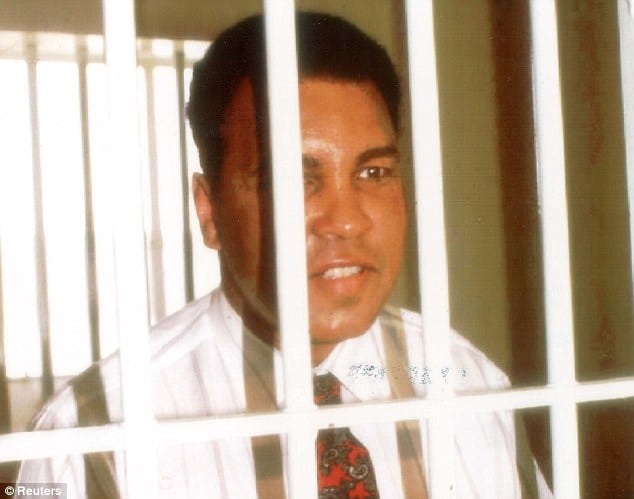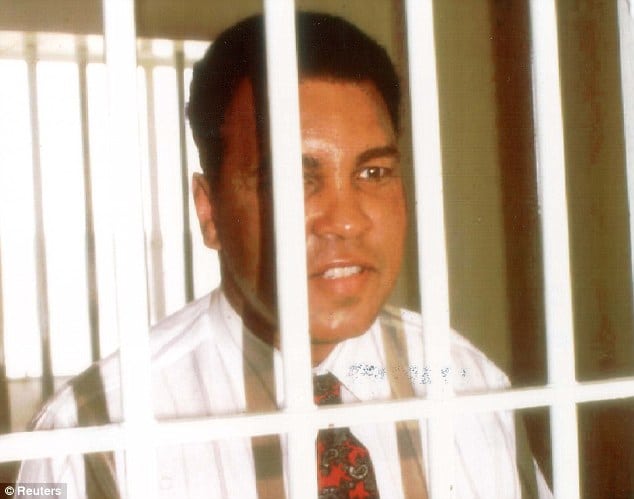Muhammad Ali’s most famous act of social activism — one that would strip him of his best fighting years, cost him millions of dollars, forever alter his image and eventually send him into debt — began with one off-hand quote: “Man, I ain’t got no quarrel with them Viet Cong.”
It was March 1966, and the U.S. military was escalating its fight in Vietnam. It began substantially lowering its standards for the draft so it could conscript more men, and call up men with lower IQs for 1-A service. This meant that Ali, whose Army-tested IQ score of 78 had been too low for the draft in 1962, was now eligible for unrestricted military service.
The boxer, who died Friday night at the age of 74, happened to hear this news while surrounded by reporters, and in a classic, boisterous knee-jerk reaction — I ain’t got no quarrel with them Viet Cong — he set off a years-long cultural revolution.
For the most famous athlete on the planet to openly decry the war was, at the time, blasphemous. When he declared his apathy toward the Viet Cong, public support of the Vietnam War was at its peak — in the first three months of 1966, the war’s approval rating was over 50 percent, according to Gallup. Ali, citing his faith and membership in the Nation of Islam, refused service and said he was a conscientious objector.
‘The Greatest’s’ Greatest Risk
In a flash, Ali, already controversial for his conversion to Islam and name change from Cassius Clay, became one of the most hated public figures in the country. Nobody close to Ali’s level of fame had resisted the draft, and his seemingly flippant opposition to the war made him a target of ridicule from the public, the government and his sport. He’d spend the next four years battling for his beliefs in court instead of the ring, and after his 1967 arrest for draft dodging, all of his state boxing licenses were stripped. Ali’s boxing career was effectively over.
For a time, Ali continued to face public pressure to accept service. During his four years of court battles, he was given opportunities to recant, apologize and join the military in an entertainment capacity — to perform for the troops and cameras and show off his own signature persona. He declined, and some of his allies turned against him.
The Nation of Islam, the same religious group that anointed him Muhammad Ali, disavowed him for his style of active resistance, according to Dave Zirin’s A People’s History Of Sports In The United States. Jackie Robinson, an athlete and activist himself during his playing years and beyond, ripped Ali for disappointing black war veterans, and by and large, black soldiers agreed with Robinson: Ali was being too radical.
“He’s hurting, I think, the morale of a lot of young Negro soldiers over in Vietnam,” Robinson said. “And the tragedy to me is, Cassius has made millions of dollars off of the American public, and now he’s not willing to show his appreciation to a country that’s giving him, in my view, a fantastic opportunity.”
But to Ali, that “fantastic opportunity” was a death sentence, and moreover, representative of the white aristocracy’s use of poor, often black Americans to fight the war for them.
“The government had a system where the rich man’s son went to college, and the poor man’s son went to war,” he said.
Anyone who immediately came to Ali’s defense put themselves in danger. In A People’s History Of Sports In The United States, writer Jerry Izenberg recalled receiving bomb threats and tons of hate mail because he was willing to hear Ali out in the early days of his service refusal. But in most of the media, nastiness prevailed. Unlike Izenberg, famous sportswriters like Red Smith and Jim Murray were calling Ali a “punk” and “the white man’s burden.”
Fair use excerpt. Read the full article here.


